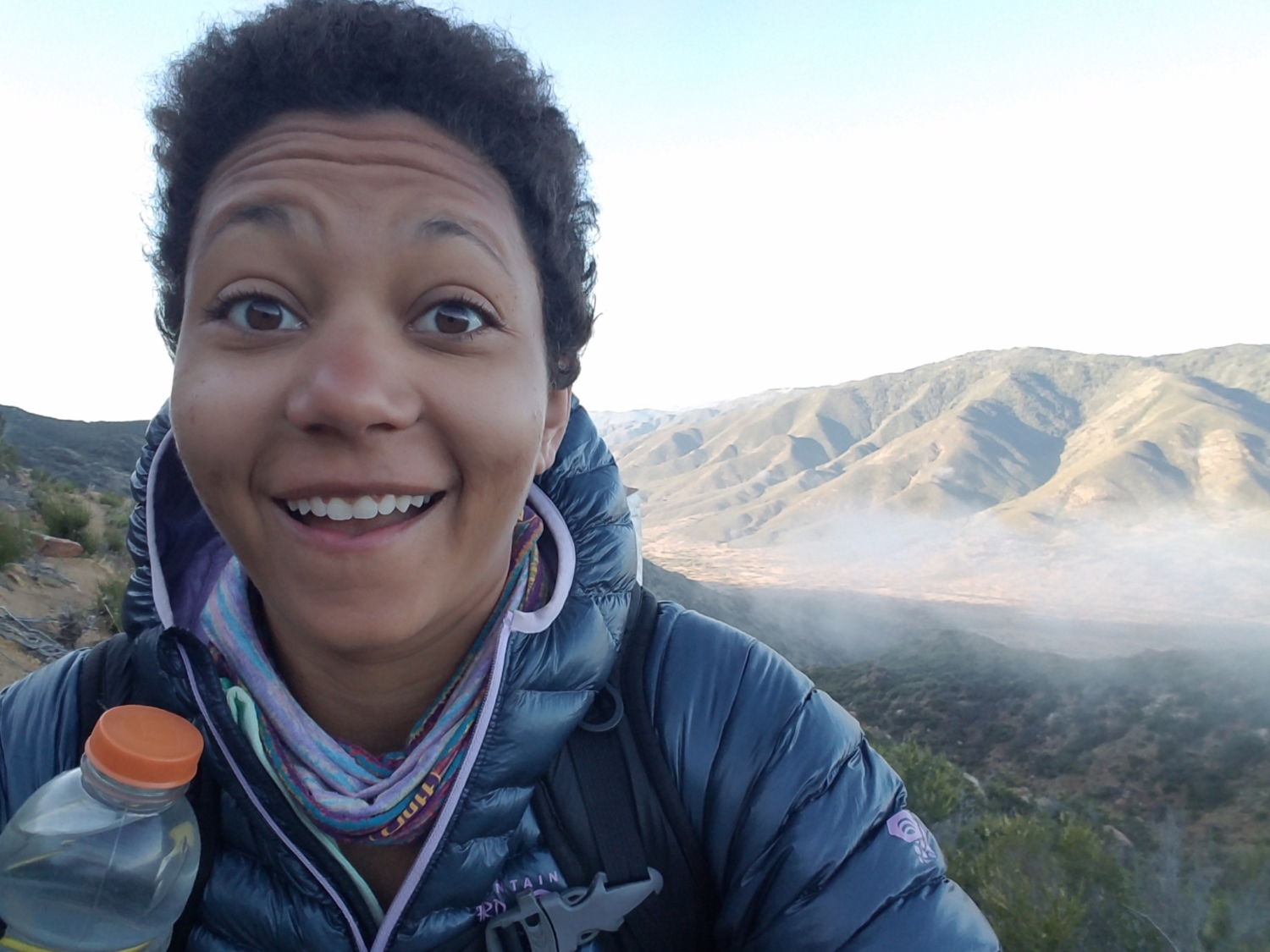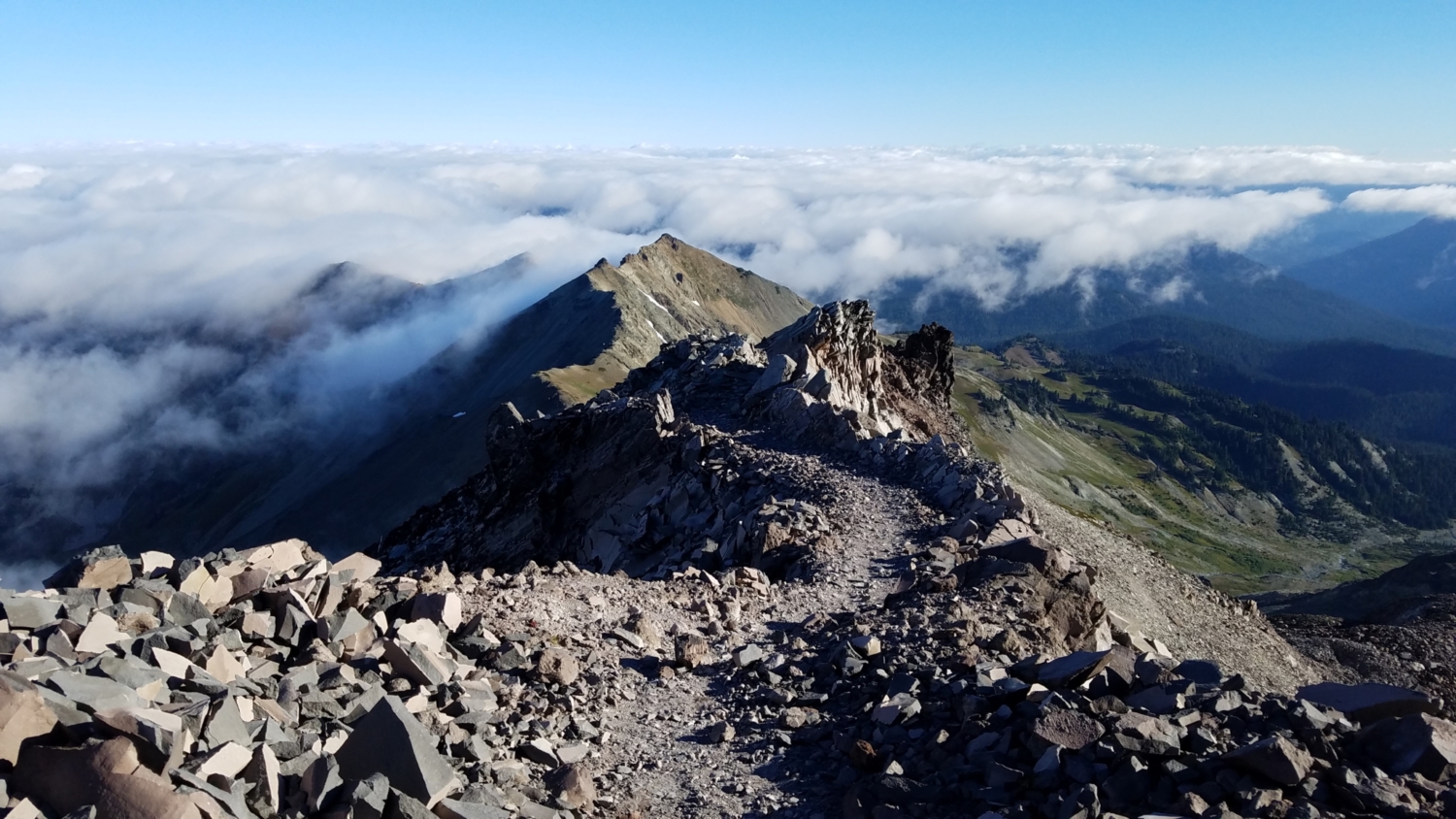Trailblazer: Amanda Jameson
Trailblazing Role: Writer and Subaru/Leave No Trace Traveling Trainer
Location: The Great Lakes to the Gulf
I’m a Modern Hiker because: I talk about belonging, difference, race, and context both on trail and online.

I met Amanda Jameson last summer on a windswept saddle in the High Sierra and recognized her immediately. In lieu of a normal greeting (and probably under the influence of mild hypoxia), I simply blurted out, “I read your blog!” A bit of surprise flashed across her face (and embarrassment across mine) and she thanked me. After the brief encounter, I ventured up the trail and never saw her again – but I kept reading.
Jameson was approximately 763 miles into a thru-hike of the Pacific Crest Trail at the time, her second long distance trail (she completed the Colorado Trail in 2015), and she chronicled the experience on her blog, Brown Girl on the (P)CT. I discovered her writing via Carrot Quinn, another thru-hiker gifted in the way of words, and immediately latched on to both her vibrant storytelling and refreshing substance, which Quinn calls a “poet-philosopher style that is so wonderful to read in a trail journal.” The most beautiful parts of her documentation weren’t tied to descriptions of flora and fauna or observations about life on a long-distance trail (though she’s skilled with both), but Jameson’s deeper reflections on navigating the social, political, and personal implications of moving along the trail as a black woman.

The first time we speak on the phone, we talk about thru-hiking – about how Jameson, a seasoned traveler, became enamored with this different way of moving through the world after watching Shane “Jester” O’Donnell’s Embrace the Brutality, a documentary about the Continental Divide Trail. She knew she wasn’t ready for the rigors of that trail, still unfinished and rough in parts, but a variety of circumstances directed her instead to the Colorado Trail, then to the Pacific Crest Trail the following year. The experiences were visceral; she can pluck the memory of a particular lunch spot or conversation with ease. She just as easily recalls the biggest lesson learned during those months on foot: “You can’t compare yourself to other people; you have to do what’s best for you. You have to do what’s good for you.”
We also talk about doing what’s good for others – namely, Jameson’s ongoing work as an educator. “I went to Vassar for my undergraduate [degree] and I pretty much immediately came to the conclusion that having fun, intense, sometimes super frustrating conversations with other people was sort of what I wanted to do with my time – [and] life.” She continued her studies in a master’s degree program at Oxford, learned to teach English as a foreign language, and went to work for a test prep company, finding meaning in helping others achieve their own goals.
Her time on long trails transformed Jameson, and this year, she added a new dimension to her work as an educator – she and her partner, Junaid “Speshul 41” Dawud, are working through next spring as Subaru/Leave No Trace Traveling Trainers. The experience seems to be a fluid one, where work and play become constantly tangled, where expectations are shattered and replaced by realizations, where the learning is just as constant as the teaching. There is the joy of days spent working with children at summer camps, fostering future stewards and outdoor enthusiasts, but there are less optimistic days, too. “When you get into a job like this, you’re like, ‘I’m going to go and change the world!” And [then you realize] that like Junaid says, it’s very much a long game of low odds.”
Still, Jameson works to better those odds with every conversation, every interaction along the way. She recalls both the beauty of the trails she’s hiked, but also the “disheartening” experience of seeing litter on trail or watching others engage in behaviors that negatively impact those around them. She knows that the key is – as always – education. “The more people that are outside, the more people are going to want to protect these spaces, right?” she says. “It’s really, really hard to stand at the rim of the Grand Canyon and be like, ‘Meh, it’s fine.’ But there are few people out there like that; most people go to a place like the Grand Canyon or a place like Voyageurs National Park and they’re like, ‘Why wouldn’t you protect this?’”

A month later, we talk again – there was a lot left unsaid the first time around, and Jameson is eager to speak. As it turns out, our initial conversation paralleled feelings of conflict that have surfaced recently about her writings, mostly centered around the day-to-day experience teaching about Leave No Trace. “It’s just like, ‘Everything’s great and everything’s cool, and we saw this thing!’” she says, frustration creeping into her voice. Instead, she wants to talk about tougher subjects, discuss barriers, share her lived reality. “It feels like talking while staying silent, and I just can’t do that anymore.”
I ask her about the conscious decision to name her blog “Brown Girl on the (P)CT,” and Jameson pauses, exhales, and then the silence is broken. “I am going to be blunt. Hiking is a very white sport, it’s a very male sport – I don’t think anybody would disagree,” she says. “When I was looking to hike the PCT, there are things that you want to know. I heard that you might have incidents where you’re dealing with microaggressions, where you’re dealing with racism. I wanted to know about those things beforehand so I could emotionally prepare myself, because it’s one thing to be hiking and on top of the world and feeling like you’re everything, and quite another thing to be jarred back into your body by observations about race that you weren’t ready for.” After running into multiple dead ends when searching for information by other black long-distance hikers, she decided to create a resource herself. “I named the website ‘Brown Girl on the (P)CT’ because that’s how I initially appear. Now, I have the afro going, but I’m not easily placeable when you first see me. That’s been my experience of life, that people are always like, ‘What are you?’”

Jameson grew up on a 12-acre farm in Ohio, outdoorsy in a non-traditional sense: she spent most of her time outside, but instead of hiking or cycling, she was climbing apple trees and mowing the lawn on a riding tractor. While most people in her area were friendly, there were a handful of others who shouted racial epithets as they passed. More common was a different kind of harassment. “I was a super nerd when I was growing up and played a lot of Dungeons & Dragons,” she explains. “I would very frequently get called an ‘Oreo.’ I was like, but I’m black, and if I’m black and playing D&D, then playing D&D is something that black people do.”
The experience of “otherness” followed Jameson to the trail. “To my understanding, there were, like, ten black people – maybe eleven, twelve – in 2016 on the PCT. Because of that, I knew that I was going to be an ambassador and I was going to be expected to speak for all black people, and that whatever I did was going to be the metric by which all other people who looked like me were going to be judged on the trail.”
Mix this implicit burden with the politically charged atmosphere of that pre-election summer, and it was no surprise that a hiker named “MAGA” became an ideological foil of sorts. While others suggested that the two would have a blowout when they finally sat down to talk along the trail in Washington, the experience in reality was quite different. “He basically told me that he was trolling (but not) in terms of having a trail name like ‘MAGA’ and wanting to vote for Donald Trump, but [he] also talked about acting out a character.” In a word, MAGA was stirring the pot, testing boundaries, without considering the impact on others. He said that the Trump campaign was filled with metaphors and insisted that most of what was promised would never come to fruition – in short, “Don’t worry, he won’t actually do any of those things.” Jameson asked “But what if he does?” Their conversation was interrupted that day, but the two followed one another on social media until after the election, when MAGA’s “character” was revealed as his true self, celebrating the very things he insisted he was just being flip about. In deference to self care, Jameson had to disconnect. “I was like, I can’t do this to myself. Not all hiker people are your hiker people.”
She touches on an oft-recited maxim about hiking – that all hikers are great people, that all get along, and that all are on the relatively same journey. Jameson explains, “I feel like there’s an assumption that you have the same experiences they do, because you’ve had this one experience that is ‘the same’ – that it is, in substance, the same and that it means the same thing. For all intents and purposes, it is the same ‘thing’ – but it’s not.” She continues, “It feels very much like white, male hikers get to be who they are, where white female hikers or minority hikers don’t necessarily get that benefit of the doubt…you never really get to escape and lose yourself in the way that other people do when they’re on the trail.”

When we step outside, we carry our not only our own history, but also the assumptions of others along for the ride. Many people are aware that certain barriers exist related to money, transportation, or physical ability, but when topics like race or ethnicity are considered in the same context, the response is often dismissive: “Why do you have to pull the ‘race card?’ Why can’t you just go outside and hike?” Jameson lets out a curt laugh when I bring this up and responds with measured sarcasm. “Oh, yeah. The one that’s in my back pocket and just makes all of my problems disappear.”
In discussing this issue, Jameson shares some deeply personal – and sobering – history. “My dad’s side of the family is from Mississippi and we have in the family a gentleman, I think it’s my great-great uncle, [who] was signing people up to vote in Hattiesburg, Mississippi. The KKK came and firebombed his house with all thirteen of the kids inside. He got everybody else out, everybody else survived, but he died in the hospital the next day of smoke inhalation, because he stayed to basically distract the KKK from everybody else getting out. That [story] was told to me by his son. So, people say ‘Oh, that was so far in the past, why are you still dwelling on this?’ This is still in living memory for a lot of people.”
She continues. “In my parents’ lifetime, forced, legal segregation was still a thing. Of course there aren’t going to be as many brown people on the trail – we were told since the end of slavery, since 1865, that we were unwelcome in public spaces. Over the course of 150 years, that’s going to kind of get ingrained into the cultural milieu. So, of course it’s going be a little bit slower [for us] to get back into hiking,” she explains. “We spent 150 years being pushed out.”
Still, there is hope that one day, Jameson won’t have to defend her presence in the outdoors or explain how the weight of history – personal, cultural, societal, political – affects her experience. She mentions groups like Outdoor Afro, Latino Outdoors, and the Facebook group Hikers of Color as positive forces for change. “Until there is that concerted effort to be like, ‘Hey, this is public space and this public space is your space, too,’ I think that we’re still going to get asked these questions,” she explains. “The efforts that are going stick are going to come from inside the community, and it takes time. It’s not like this is going to happen suddenly overnight.”
In the meantime, Jameson will keep hiking, teaching, and writing with clarity and honesty – and a desire to continue the conversation. “Being in a lot of outdoor spaces for the [Leave No Trace] job, it’s very rare that I’m not either the only brown person in the space or one of a handful of the only brown people in a space. The more people of color that are outside, the more that the burden is taken off of any one individual.” She pauses in reflection, then adds, “I just want to normalize brownness in the outdoors.”
all photos courtesy Amanda Jameson, except the final photo, by Lindsay Brisko (www.imoutro.com)
More Trailblazers profiles:
[display-posts tag=”trailblazers” posts_per_page=”5″]
Tags: Amanda Jameson, Brown Girl on the PCT, Colorado Trail, culture, Leave No Trace, long distance hiking, Pacific Crest Trail, race, Subaru, thru-hiking
